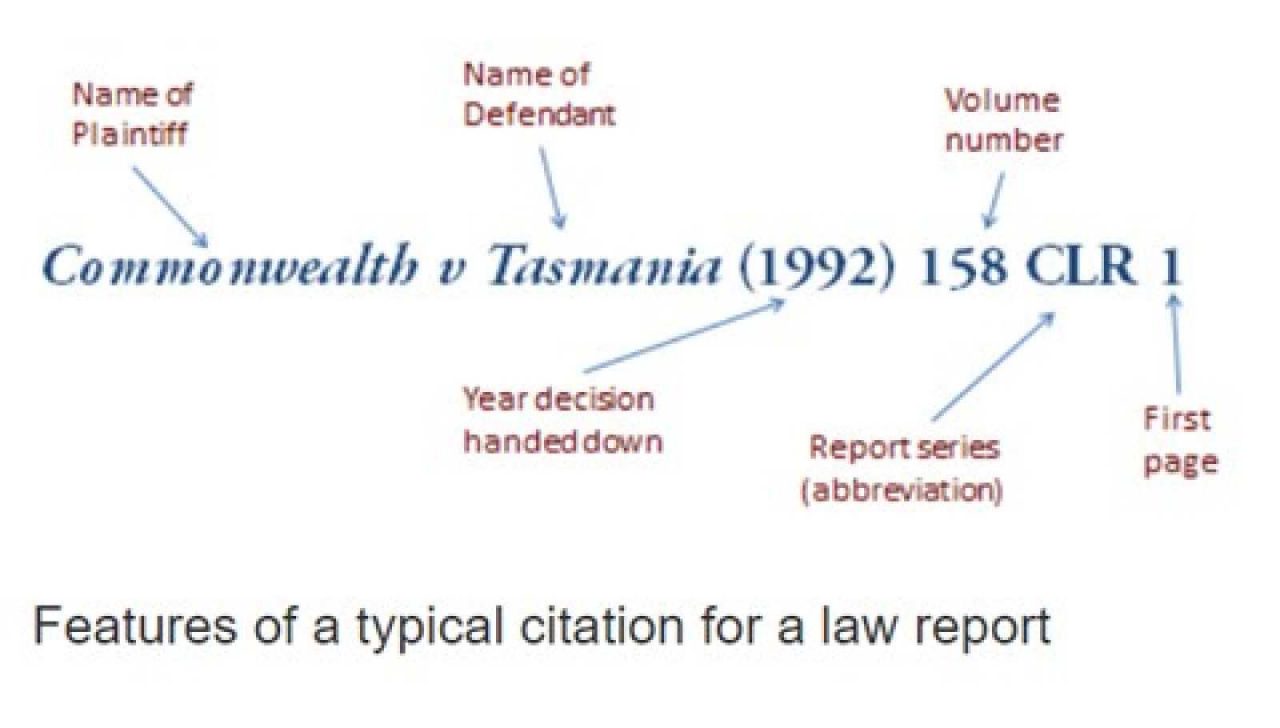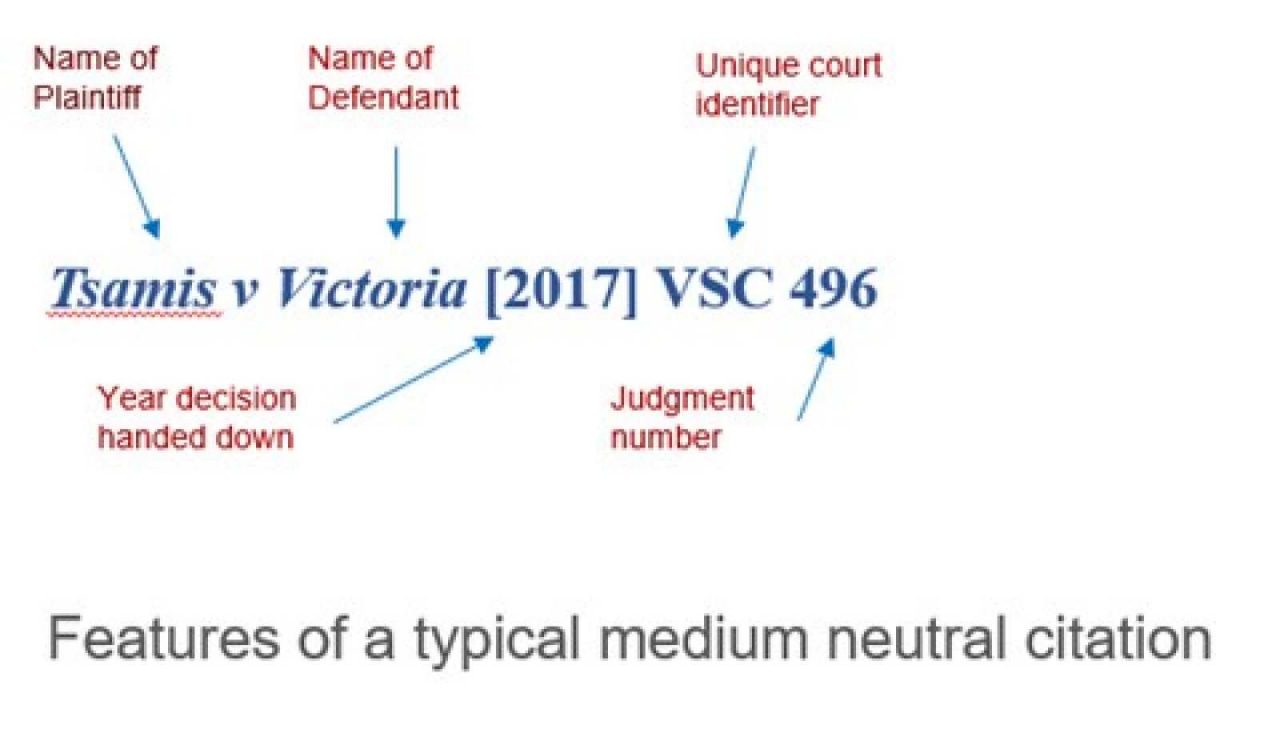Understanding legal sources
Case law
- Legal cases
A legal case is a dispute between opposing parties resolved by a court or equivalent legal process. Typically, this results in a judgment based on a judge’s interpretation of the applicable law.
- Common law
The body of rules or principles derived from previously decided cases constitutes the common law as a legal system. Courts are organised in a hierarchical manner and judges in lower courts must follow decisions made in superior courts.
- Case law research
Case law research involves locating and reading relevant judgments to understand the legal principles behind them, then applying these principles to a new set of circumstances.
Law reports
Law reports collect and publish or 'report' recent decisions of select courts and tribunals. In general, only the judgments of superior or appellate courts are reported, since their decisions set precedents for all lower courts in the judicial hierarchy.
Authorised law reports
Important cases are often reported in more than one law report series. However, among the reports available, only one is ‘authorised’. It is this version that judges expect to have presented to them in any legal proceedings.
Below is a list of authorised reports for select Australian courts.
- High Court of Australia > Commonwealth Law Reports
- Federal Court of Australia > Federal Court Reports
- Supreme Court of New South Wales > New South Wales Law Reports
- Supreme Court of Victoria > Victorian Reports
- Supreme Court of Queensland > Queensland Reports
Unreported judgments
Unreported judgments are judgments that have not been published in a law report, including cases that:
- will be reported in due course, as they bring something new to the understanding and interpretation of law
- will never be reported, including cases from lower courts or those deemed not to have set a new precedent.
Today, many unreported judgments are widely available in subscription databases or in free, open access legal databases, such as AustLII. They can also be sourced directly from the applicable court or court library.
Case citations
To find a case it is useful to understand how a case citation is compiled;


Case citators
A case citator is a tool for locating cases by subject and legal principle, and for discovering information about specific cases.
Case citators provide basic data on cases, such as:
- jurisdiction
- name of judge/s
- date the decision was handed down
- full names of the parties
- medium neutral citation and citations of all the law reports where a decision can be found (parallel citations).
For most cases located on a case citator, the following information is also available:
- a digest or summary of the decision
- other cases that the parties relied on for precedents
- words or phrases judicially defined in the proceedings
- legislation referred to in the case
- significant journal articles referencing the case.
Case citators also provide information about the subsequent judicial history of a case. That is, it lists all subsequent cases that have cited a particular decision as a precedent since it was first delivered. By use of flags or other symbols, the citator indicates whether the original case and each subsequent case citing it are still “good law”, meaning that the decisions have not been overturned by judges in superior courts.
Recommended case citators
- CaseBase is a stand-alone case citator on the Lexis+ Australia database.
- Westlaw Australia Westlaw Australia presents case citator information in association with the full-text cases themselves, rather than as separate records in a stand-alone database.
- LawCite is the case citator for the open access legal database AustLII.
Legislation
Parliamentary process
These links contain information about the legislative process in Australia:
From the Commonwealth Parliament website
From the New South Wales Parliament website
Bills and explanatory memoranda
- Bills
A Bill is a piece of draft legislation introduced to parliament with the aim of passing it into law. A Bill will only become law if it successfully passes through both houses of parliament in identical form. During its passage through parliament, a Bill is debated on a number of occasions and may change considerably before passing into law. Not all Bills successfully pass through parliament and become law.
- Explanatory memoranda
Sometimes called explanatory notes, depending on the jurisdiction, explanatory memoranda are documents presented to parliament in the early stages of a Bill’s passage through parliament. An explanatory memorandum seeks to explain what provisions in a particular Bill mean, and what the Bill is attempting to achieve if passed as law.
Hansard (the official report of parliamentary debate)
Hansard, or the official report of parliamentary debates, is a transcription of everything that is said in the House of Representatives, the Senate, the Federation Chamber and committee hearings (and relevant state equivalents). It also records votes and divisions, written statements, and other actions. Hansard is available for each Australian jurisdiction.
Hansard includes second reading speeches made in parliamentary debate during which Parliamentarians speak either in favour or against a current Bill. Like explanatory memoranda, these speeches can be invaluable tools in terms of understanding why a law was enacted, what it was designed to achieve, and what the law means.
For Commonwealth Hansard and New South Wales Hansard, proof versions are available about 3 hours after daily sitting, and final versions are available around 2 weeks after.
Acts (statutes)
When a Bill is passed by Parliament, it becomes an Act (also known as a statute). It does not become law until it has received assent, and the Act (or parts of an Act) may not actually commence until a later date.
Delegated legislation (subordinate legislation)
Delegated legislation (also known as subordinate legislation) is made by a person or group to whom such power has been delegated. This delegation is made not directly by an Act of Parliament but under the authority of an Act of Parliament.
Delegated legislation includes:
- regulations
- rules
- by-laws
- orders
- ordinances
According to Sanderson and Kelly’s A Practical Guide to Legal Research (Thomson Reuters, 2017 4th ed. Pg. 57), “Delegated legislation usually concerns matters which are administrative in nature, involve technical or procedural issues or cover an area of law which changes or requires updating frequently. It is more efficient for these types of matters to be dealt with by delegated bodies rather than involve the slower and more complex parliamentary process.”
Law reform
Law reform agencies are generally statutory bodies acting independently of government. They are tasked by government to conduct inquiries into, and to make recommendations for changes to existing laws in a particular area. Governments are not compelled to implement recommendations, however, over 85% of Australian Law Reform Commission Reports have been at least partially implemented, demonstrating that this is an effective method of bringing about legislative reform.
For more information about law reform visit the Australian Law Reform Commission.
Finding legislation
To find Legislation browse our recommended databases and websites. Use Legal Research Foundations Module 4: Legislation to learn more about how to locate Acts, Bills, delegated legislation and associated history and notes, as well as second reading speeches, explanatory memoranda, parliamentary debates and committee reports.
International law
According to the United Nations, “international law defines the legal responsibilities of States in their conduct with each other, and their treatment of individuals within State boundaries.”
Treaties
Treaties are a form of written agreement between countries under international law. Treaty is a general term which can describe charters, conventions, protocols, covenants, agreements, pacts and exchanges of notes.
- Bilateral treaties create limited and specific obligations or laws for the two states that consent to them and comes into effect upon signature, or at a future time agreed to by the states.
- Multilateral treaties are between more than two countries. They are explicitly intended to codify customary practice, create new rules or establish international agencies (such as the International Criminal Court, for example).
Signing a multilateral treaty usually does not bring it into force – a later ratification step is required by states and the treaty may not come into effect until a certain number of ratifications occur.
See Gerhard Von Glahn & James Taublee, Law Among Nations: An introduction to Public International Law (Routledge, 12th ed., 2022) Ch. 4 – ‘International Agreements’ for further information.
International judicial decisions
A judicial decision can be a decision made by an international tribunal or a domestic body regarding a question with international implications.
Generally, decisions made by international courts and tribunals are considered more influential in terms of the development of international law. Consistent decisions of national courts over time carry some impact regarding interpretation.
Although international courts and tribunals do not treat prior decisions as precedent in the same manner as a domestic common law court, they do attempt to maintain consistency of decision making where matters are similar.
See Gerhard Von Glahn & James Taublee, Law Among Nations: An introduction to Public International Law (Routledge, 12th ed., 2022) Ch. 3 – ‘Sources of the Law’ for further information.
United Nations (UN)
The United Nations (UN) was established in 1945 under the Charter of the United Nations. It replaced the League of Nations, which was established in 1919 to encourage international co-operation and security.
The UN currently consists of 193 member states and operates in 6 main bodies:
The main deliberative organ represented by all member states.
Responsible for the international peace and security, the Security Council is made up of 5 permanent and 10 non-permanent members.
The principal organ coordinating economic, social and related work, involving 54 member states.
The principal judicial organ (see Courts, Tribunals and Cases tab)
Established in 1945, this body oversaw 11 trust territories until their independence was completed in 1994. Now the Trusteeship Council meets only as required.
The Secretariat carries out the day-to-day work of the UN.
Finding international law
To find international law browse our recommended databases and websites. Use Legal Research Foundations Module 5: Foreign and International Law to learn some of the additional skills you’ll need for searching international law as well as some of the advantages and disadvantages of key databases.
Contact
We're here to help, online or in person.